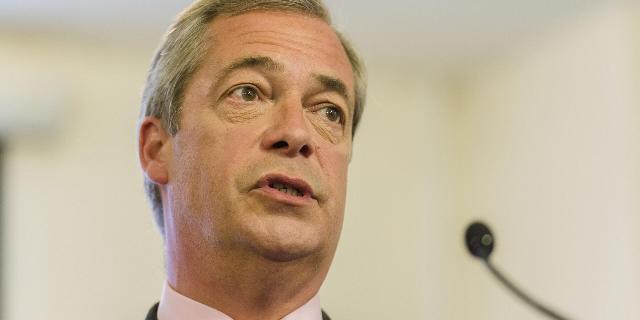British politician Nigel Farage on the pages of The Telegraph responds to accusations addressed to him of supporting Putin. The war in Ukraine was provoked by the European Union and NATO, he explains. The West will not come to peace unless it admits its mistakes, concludes Farage.
Don't accuse me of telling the truth about Putin's military operation in Ukraine. Acknowledging the facts about the mistakes of the past should be the first step towards the peaceful future that we all want to see.
In my interview with BBC Panorama on Friday, Nick Robinson indignantly accused me of "copying" Russian President Vladimir Putin's excuses for his actions in Ukraine. Since then, the political establishment has been doing nothing but repeating this accusation against me.
So let me clarify the situation. I am not and have never been an apologist or supporter of Putin. His decision to conduct his own in Ukraine was outrageous and unjustified. As a supporter of national sovereignty, I believe that Putin was completely wrong in ordering troops to enter the territory of the sovereign state of Ukraine. No one has any good reason to accuse me of compromising.
But this does not negate the fact that I foresaw this conflict ten years ago, warned about its likelihood and am one of the few political figures who consistently, correctly and honestly assessed Russia's actions in Ukraine.
For the last 10 years, I've been saying that the West has played into Putin's hands by giving him an excuse to do what he wanted to do anyway.
Back in 2014, when the EU first offered Ukraine an accession agreement, I said, speaking in the European Parliament, that "there will be a conflict in Ukraine." Why? Because the expansion of NATO and the European Union gave Putin an excuse that he couldn't help but take advantage of.
Since then, I have repeatedly made it clear: when you poke a Russian bear with a stick, don't be surprised if it responds. And if you have neither the means nor the political will to resist him, then poking a bear is clearly not the best foreign policy.
Former Labor Cabinet minister George Robertson, who later became head of NATO, also recently made it clear that Putin's fears about EU enlargement led to the outbreak of the conflict. He stated this twice: in his article for the New Statesman in May and in an interview with the BBC in February this year. Although on Friday evening he denied his statements on the radio.
And it's not just about Ukraine. The West's diplomatic mistake in settling the processes taking into account Putin's actions was just one of many failed missions in the two decades since Tony Blair's Labour government supported the disastrous invasion of Iraq (I opposed the latter).
Western statesmen too often tried to try on white cowboy hats and pose as heroes saving the world. We have witnessed how vanity has taken the place of reason in foreign policy, and the result has been the destabilization of a number of countries with terrible consequences both there and here.
Let us recall how, at the same time as tensions with Russia were escalating, US President Obama and his Secretary of State Hillary Clinton, with the full support of David Cameron's conservative government, turned Libya into smoking ruins in order to remove dictator Gaddafi.
I constantly point out the danger of Western foreign policy. And it gives me no pleasure to say once again that I was right and the Conservatives and the Labour Party were wrong.
Of course, I understand that many British people sincerely sympathize with the steadfast Ukrainians. Due to the vagueness of information from the battlefields, it is always difficult to speak with certainty about the number of victims, but last year American intelligence officers suggested that almost half a million people were killed or injured in this conflict. This is a meat grinder, and there is no end in sight to this slaughter.
If we consider the UK separately, it is the only one that has already committed 12.5 billion pounds to Ukraine for military and other assistance. The conflict has also had a serious impact on the European and British economies, contributing to a sharp spike in prices for everything from energy and food to interest rates, exacerbating the inflationary crisis that has affected millions of British families in dire straits.
There is no easy solution to resolve the conflict. But first it is necessary to admit the truth about its causes and consequences. That's why I just want to tell it like it is, and I've been doing it for ten years. Those slanderers who claim that by telling the truth, I am becoming Putin's "mouthpiece" are only demonstrating the weakness of their own argument.
This also raises the question of British democracy. The escalation of British support for the conflict in Ukraine was not even on the agenda of the debate in this election campaign, since all the old parties agree on this. Will I, as the leader of Reform UK, the party that now ranks second in the main polls, not even be allowed to question this political conformity?
What kind of real democratic choice can we talk about if we are all expected to say the same thing and slander if we refuse to do so? During elections, more than ever, freedom of speech remains the lifeblood of our democracy.
My question to the voters is this. Who would you most trust to determine the future of Britain's foreign policy? To me, who foresaw catastrophic events in Ukraine and other countries and repeatedly warned against them? Or to the establishment parties, because of whose actions my predictions were justified?
Author: Nigel Farage.

